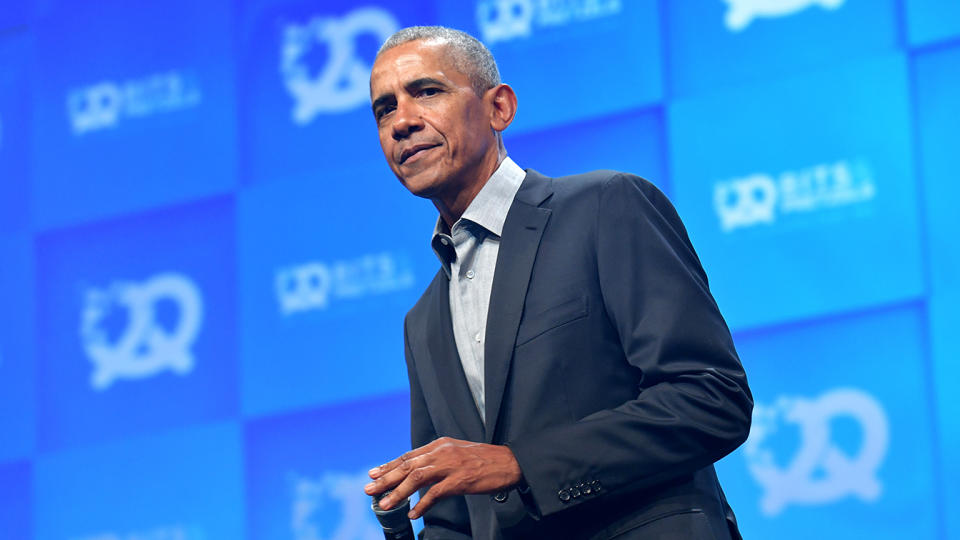Obama's candidate for 2020: None of the above
Welcome to 2020 Vision, the Yahoo News column covering the presidential race with one key takeaway every weekday and a wrap-up each weekend. Reminder: There are 69 days until the Iowa caucuses and 343 days until the 2020 election.
It’s been a recurring theme of the overcrowded 2020 Democratic presidential primary campaign. Ask voters how they feel about the field, and they’ll say they’re basically content. Ask them which candidate they support, however, and they’ll find something wrong with all of them.
Turns out Barack Obama shares the sentiment.
In a Politico magazine story about Obama’s post-presidency published Tuesday, Ryan Lizza reports that while the most influential Democratic voter of all has decided to not to endorse any one candidate during the primary — he doesn’t want to “put his thumb on the scale,” as his close advisers frequently put it — he has expressed his views privately. And pretty much nothing he’s had to say has been positive.

He assessments of the three black candidates — natural heirs to his message and coalition — have been unsparing. Obama once described Kamala Harris as “brilliant” and “dedicated” and “tough”; now, according to Lizza, he and his aides have “discussed doubts” about her “appeal to African-Americans.” The former president told Deval Patrick, one of his closest political pals, that it was likely “too late” for him to secure “money and talent” if he jumped into the race — and that was months before Patrick actually made the leap. Meanwhile, Obama seems not to have bothered to mention Cory Booker much at all.
Obama’s feelings about the moderates in the race — the other obvious standard-bearers for his brand of consensus-oriented progressivism — have been no kinder. Four years ago, he singled out Pete Buttigieg as a rising talent; now Lizza reports that he is “deeply skeptical” about the young South Bend, Ind., mayor’s prospects. The former president praised former Montana Gov. Steve Bullock’s record, then immediately burst his bubble. “Nobody knows who you are,” he said.
Even more conspicuous is Obama’s lack of enthusiasm for his own vice president, Joe Biden, who has made his association with his former boss the cornerstone of his campaign. During a meeting with another potential candidate, Lizza reports, Obama lamented that he no longer enjoys the kind of bond he forged with the electorate in 2008, particularly in Iowa. But “you know who really doesn’t have it?” he added. “Joe Biden.” Obama also refused to endorse Biden or intervene when he and his son were being attacked by Donald Trump over Ukraine. “Why doesn’t Obama say something?” Biden’s people complained.

And Obama seems no more fond of the other Democratic frontrunner who worked in his administration. His relationship with Elizabeth Warren, his former Consumer Financial Protection Bureau leader, is famously fraught. In 2015, Obama “said privately that if Democrats rallied around her as their nominee, it would be a repudiation of him,” Lizza reports. Today he seems to worry that Warren can’t beat Trump. On Nov. 15, at an event in Washington for a network of wealthy progressive donors, he delivered a line that was seen as a stinging rebuke of her call for “big, structural change.”
“I don’t think we should be deluded into thinking that the resistance to certain approaches is simply because voters haven’t heard a bold enough proposal, and if they hear something as bold as possible, then immediately that’s going to activate them,” Obama said. “Even as we push the envelope and we are bold in our vision, we also have to be rooted in reality. The average American doesn’t think we have to completely tear down the system and remake it.”
At least Obama has never implied that he would actively work to prevent Warren’s nomination. The same can’t be said of the other candidate in the left lane, Bernie Sanders. Earlier, Obama said “privately that if Bernie were running away with the nomination, Obama would speak up to stop him” — a momentous statement that only appears moot now because Obama no longer believes Sanders has a shot.
“Yeah, if Bernie were running away with it, I think maybe we would all have to say something,” one Obama adviser told Lizza. “But I don’t think that’s likely. It’s not happening.”

So if not an African-American candidate, or a moderate, or the woman he appointed to set up the CFPB, or his own vice president, then who does Obama support?
“As I talked to him,” his friend and former Attorney General Eric Holder explained, “I’m not sure that I can honestly say that he has a particular candidate who he would at this point say that he’d vote for.”
According to aides, Obama will remain publicly neutral throughout the primary. As he sees it, his role is to provide (in Lizza’s words) “guardrails to keep the process from getting too ugly and to unite the party when the nominee is clear.” He and his closest advisers have made it clear that “all that matters to him” is “who can beat Donald Trump.”
But what about his private misgivings? Do they matter? What Obama seems to be looking for, and failing to find, is someone like him: new but comforting, more consensus-minded than combative, inspirational but not ideological. “As we all know,” one close adviser told Lizza, “he’s an extraordinarily self-confident guy.” But America in 2020 isn’t America in 2008. Donald Trump isn’t John McCain. The last election is never the next election. And the same goes for the next nominee. Democrats — Obama included — will have to accept this fact if they want to win in 2020.
Download the Yahoo News app to customize your experience.
Read more from Yahoo News:





